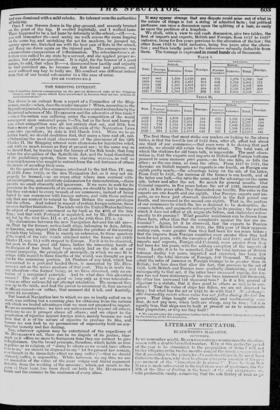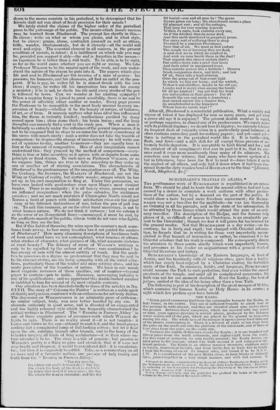BLACKWOOD'S MAGAZINE.
LITERARY SPECTATOR.
SEPTEMBER.
IF we remember ariglut, B LACK WO OD always commences the shooting- season with a double-baiTelled number. Why at this particular peril !d of the year is he stimulated to the propagation of twins ? will not twelve o%pring in the twelve months content the sturdy soxagenorian ? But if, according to the principles of a certein arithmetic, he mast have thirteen to the dozen, why does he choose always to uncouple at the pre- cise moment of the " ouverture de la Chasse'" Does he deem that MAGA is made subservient to the inglorious uses of sportsmen, like the MS. of the Man t,/'Tiding in the hands of the oily clergyman ; or, with pardonable vanity, conceiving that the sole library of such as its
down to the moors consists in his periodical, is he determined that his friends shall not run short of fresh provision for their minds ?
We lately stated the claims of the higher order of the periodical
press to the patronage of the public. The means which insure success may be learned from Blackwood. The precept lies shortly in this— Be clever : write on what or whom you please, and in what style, but be clever : praise, abuse, contradict yourself as well as others, trifle, wander, rhodomontade, but do it cleverly—all the world will read and enjoy. The essential element in all success, in the present condition of morals, is talent : it is indifferent on which side you may be, provided you support it ably—the end is forgotten in the means— an ingenious lie is better than a dull truth. To be able, is to be right, as far as the world cares whether you are right or wrong. We take Professor WILSON to be the master-spirit of the work, and can under- stand the nature of the charm he puts into it. The papers which give life and soul to Blackwood are the reveries of a man of genius : his passions, his humours, and his pleasures, all find an outlet at the pen- point. If he is gay, he writes till he is almost drunk with his own ideas ; if angry, he writes till his imagination has made his enemy a monster ; if he is sad, he sheds his ink until every stroke of the pen is followed by tears. Can we wonder at his exciting sympathy ? When a copious fancy is joined to great sensibility, there is no end to the power of affecting either auditor or reader. Every page proves the Professor to be susceptible in the most lively manner to every im- pression of beauty—whether it be the beauty of nature, of holiness, of art, or of form. It scarcely matters what beau ideal has influenced him, the flame is instantly kindled ; recollections purified by fancy crowd upon him ; ideas come thick ; his brain burns ; and the busy thoughts can scarcely find a vent in the ready pen. When a man is habitually so entirely under the influence of the present impression, it is not to be supposed that he stops to examine the truth or consistency of his views with much nicety : such a writer does not take the trouble of comparison: he despises the charge of inconsistency: he will write one set of opinions to-day, another to-morrow—they are equally true to him at the moment of composition. Men of slow imagination cannot understand this: they proceed by the method of comparison—every- thing is true or false according as it agrees with or departs from some principle or fixed dogma. To such men as Professor WILSON, or as we suppose him, things are true or false according as they wake up one or another set of stirring associations. The characteristic of Blackwood is the predominance of the imagination over all. The Whig, the Cockney, the JEFFREY, the Hamm of Blackwood, are not the Whig or Cockney of reality, but certain wooden images which he has set up in his own imagination to fling at. Under this persuasion, we have ever looked with good-nature even upon Maga's most virulent tirades. There is no malignity ; it is all heioety abuse, growing out of an inflamed imagination : when the pulse subsides, the nightmare Vanishes ; and we are much mistaken if Christopher North would not liscuss a bowl of punch with infinite satisfaction vis-a-vis the object :Any of his bitterest declarations of war, before the pen of gall was lry. To call this insincere, or on the other hand mercenary, is not to :now human nature. We do not think it virtuous ; but we esteem it as the error of an ill-regulated fancy—encouraged, it must be said, by the profligate morals of the public, who in truth do not care who fights, as long as they see the fun. But if this habit of throwing the reins upon the courser's neck some- times leads astray, to how many beauties has it not guided the readers of Blackwood ! How many charming descriptions of loveliness both of form and mind have we not contemplated, what touches of nature, what strokes of character, what pictures of life, what accurate sketches of rural beauty ! The delicacy of many of WILSON'S writings is only to be equalled by the ardour of others : rare combination ! he has energy of arm with the utmost subtiity of touch. But the quali- ties he possesses in a degree so predominant that they may be said to be his characteristics, are his lively sympathy with all the social affec- tions, particularly those of the tender and more retiring class, and his acute perception of the beauties of nature. We have in our minds most exquisite instances of these qualities, out of number—beyond paper to contain—pen to indite. Moreover, unwearying industry is one of his qualifications ; and we apprehend this double-bodied number is indebted to him for several of its most valuable contents.
Our attention has been directed chiefly to three of the articles in No. CINII. The story of " Colonna the Painter" is written in a noble spirit of dignity and passion, combined with an enthusiasm for art truly Italian. The discussion on WORDSWORTH is an admirable piece of criticism : no similar subject, truly, was ever better handled by any one. It abounds uniformly in good sense, and is divested of an exaggerated and too highly coloured style which has frequently characterized the critical writings in Blackwood. The " Evening in Furness Abbey" is one of those exquisite pieces of gossamer-work which WILSON de- lights to spin. There is no reality about it—it is not tangible : it hangs and shines in the sun—attempt to snatch it, and the hand grasps nothing but a complicated lump of dull-looking cotton ; but let it float upon the air, catching branch after branch, and to the fancy of the beholder imaging all kinds of fairy architecture—it is then where na- ture intended it to he. The story is a tale of passion ; but passion in WILSON'S poetry is a thing so pure and elevated, that if it were not also bright and eloquent, it would be considered dull : it is unsubstan- tial, but then it is e quisitely beautiful. Take, as a commentary on all we have said of a favourite author, one passage of holy beauty and truth from the " Evening in Furness Abbey."
"The day goes by,
On which our soul's beloved dies ! The day, On which the body of the dead is stretch'd by hands that deck'd it when alive ; the day On which the dead is shrouded; and the day Of burial—one and all pass by ! The grave.
Grows green ere long; the churchyard seems a place Of pleasant rest ; and all the cottages, That keep for ever sending funerals Within its gates, look cheerful every one, As if the dwellers therein never died, And this earth slumbered in perpetual peace. For every sort of suffering there is sleep Provided by a gracious Providence, Save that of sin. We must at first endure The simple wo of knowing they are dead, A soul-sick wo in which no comfort is, And wish we were beside them in the dust !
That anguish dire cannot sustain itself; But settles down into a grief that loves And finds relief in unreproved tears.
Then cometn sorrow like a Sabbath I Heaven Sends resignation down, and faith ; and last Of all, there falls a kind oblivion Over the going out of that sweet light In which we had our being ; and the wretch, Widow'd and childless, laughs in his old age, Laughs and is merry even among the tombs Of all his kindred ! Say not that the dead Arc unforgotten in their graves ! For all Beneath the sun and moon is transitory ; And sacred sorrow like a shadow flies, As unsubstantial as the happiness Whose loss we vainly wept ! "
After all, Blackwood is a wonderful publication, What a variety and vigour of talent it has displayed for now so many years, and yet what a green old age it is enjoying! The present double number is equal, or perhaps superior, to almost any of its predecessors. We rarely agree with its political dogmas ; we do not love its bigotry; we can only tolerate its frequent dash of vulgarity when in a particularly good humour; it often contains exceeding good-for-nothing papers ; and yet—and yet— there is nothing in the periodical world like it. It is turtle—fish, flesh, and fowl—and a rich dish for all except those persons of ex- tremely feeble digestion. It is acceptable to both friend and foe ; and the greatest of all compliments that can be paid to it is, that its ene- mies read it even more assiduously than many of its admirers We ourselves can bear witness, that many who have never spoken of it but in bitterness, have been the first to read it—have taken it up to the neglect of all others, and only laid it down when it had been exa- mined from the dirty wooden head of BUCHANAN to the final " [reread, North, Shepherd, cy•c.]"



















 Previous page
Previous page